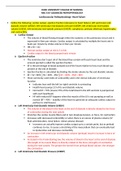NSG 533 (NSG533)
Rush University
Page 3 out of 27 results
Sort by
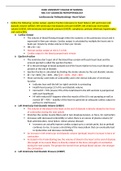
-
RUSH UNIVERSITY COLLEGE OF NURSING NSG 533--ADVANCED PATHOPHYSIOLOGY Cardiovascular Pathophysiology: Heart Failure
- Exam (elaborations) • 21 pages • 2023
-
- $9.49
- + learn more
Define the following: cardiac output, ejection fraction (relevance to heart failure), left ventricular enddiastolic volume (LVEDV), left ventricular end diastolic pressure (LVEDP), left ventricular end-systolic volume (LVESV), left ventricular end-systolic pressure (LVESP), compliance, preload, afterload, hypertrophy, and contractility. o Cardiac Output The volume of blood flowing through either the systemic or the pulmonary circuit and is expressed in liters per minute. Cardiac output ...
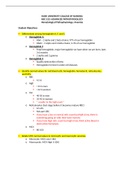
-
NSG 533 Module 6 Hematologic Disorders Objectives. study solution
- Exam (elaborations) • 12 pages • 2023
-
- $9.49
- + learn more
Student Objectives Differentiate among hemoglobin A, F, and S. o Hemoglobin A HbA – 2 alpha and 2 beta chains; 97% of our hemoglobin HbA2 – 2 alpha and 2 delta chains; 2-3% of our hemoglobin o Hemoglobin F Fetal hemoglobin, major hemoglobin we have when we are born, lasts 3-6 months 2 alpha and 2 gamma o Hemoglobin S Quality dysfunction of beta Hemoglobin formed in sickle cell diseases Identify normal values for red blood cells, hemoglobin, hematoc...
NSG 533--ADVANCED PATHOPHYSIOLOGY Cardiovascular Pathophysiology: Heart Failure
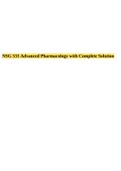
-
NSG 533 Advanced Pharmacology with Complete Solutions.
- Exam (elaborations) • 26 pages • 2023
-
- $11.49
- + learn more
NSG 533 Advanced Pharmacology with Complete Solution Revised Questions And Answers. 1. EP is a 38-year-old female patient that comes in for diabetes education and management. She was diagnosed 12 years ago and states lately she is not able to control her diet although she continues a 1600 calorie diet with appropriate daily carbohydrate intake (per dietitian prescription) and walks 40 minutes every day of the week. She states compliance with all medications. She denies any history of hy...
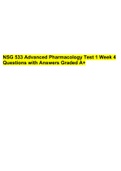
-
NSG 533 Advanced Pharmacology Test 1 Week 4 Questions with Answers Graded A+.
- Exam (elaborations) • 13 pages • 2023
-
- $9.49
- + learn more
NSG 533 Advanced Pharmacology Test 1 Week 4 Questions with Answers Graded A+ . 1. Which of the following SSRIs requires up to a 5-week washout period because of the long half-life of its potent active metabolite? A. Escitalopram B. Fluvoxamine C. Fluoxetine D. Sertraline: C 2. Which of the following symptoms is most likely to improve within approximately 1 week of starting treatment? A. Depressed mood B. Suicidal thoughts C. Anhedonia D. Sleep: D 3. Of the following combinations of...
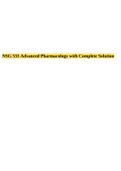
-
NSG 533 Advanced Pharmacology with Complete Solution.
- Exam (elaborations) • 26 pages • 2023
-
- $11.49
- + learn more
NSG 533 Advanced Pharmacology with Complete Solution. 1. EP is a 38-year-old female patient that comes in for diabetes education and management. She was diagnosed 12 years ago and states lately she is not able to control her diet although she continues a 1600 calorie diet with appropriate daily carbohydrate intake (per dietitian prescription) and walks 40 minutes every day of the week. She states compliance with all medications. She denies any history of hypoglycemia despite being able to...
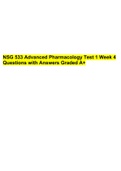
-
NSG 533 Advanced Pharmacology Test 1 Week 4 Questions with Answers Graded A+.
- Exam (elaborations) • 13 pages • 2023
-
- $10.99
- + learn more
NSG 533 Advanced Pharmacology Test 1 Week 4 Questions with Answers Graded A+ . 1. Which of the following SSRIs requires up to a 5-week washout period because of the long half-life of its potent active metabolite? A. Escitalopram B. Fluvoxamine C. Fluoxetine D. Sertraline: C 2. Which of the following symptoms is most likely to improve within approximately 1 week of starting treatment? A. Depressed mood B. Suicidal thoughts C. Anhedonia D. Sleep: D 3. Of the following combinations ...

How did he do that? By selling his study resources on Stuvia. Try it yourself! Discover all about earning on Stuvia

